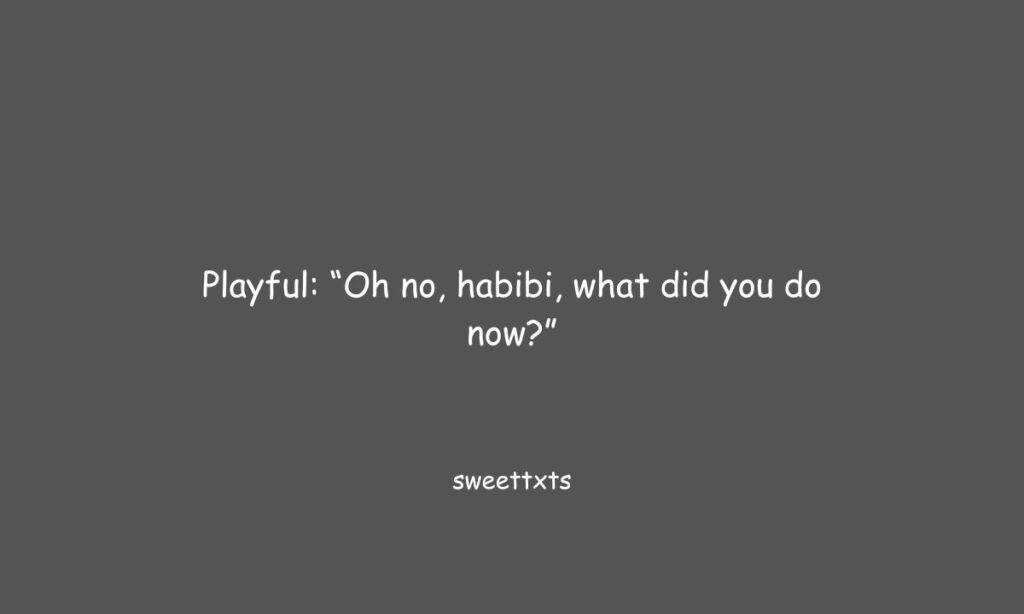The word habibi means “my dear” or “my love.” People use it to show care for someone. You can say it to a friend, a parent, or someone you like.
The word hiatus means a short break or a pause. When someone is tired, they can take a hiatus to rest. It helps people feel better and come back fresh.
There are many ways to say hiatus in a polite way. Some people say taking a break, time off, or on pause. These words are soft and easy to understand.
What Does “Habibi” Mean?
The word habibi (حبيبي) is Arabic and translates literally to “my love” or “my dear”. It is derived from the root word ḥ-b-b, which means love or to love. In conversation, it’s a term of endearment used for someone close—be it a family member, a close friend, or a romantic partner.
🟢 Key Points:
- “Habibi” is masculine. The feminine version is “Habibti” (حبيبتي).
- Used widely in Arabic-speaking countries, but also popular globally via music, TV, and social media.
- Common in greetings, expressions of care, and casual affection.
Habibi Meaning in Text*

In text conversations, habibi maintains the same sentiment, often used in informal or affectionate contexts.
🟢 Examples of “Habibi” in Text:
- “Good morning, habibi 🌞, hope your day is amazing!”
- “Miss you, habibi. Let’s catch up soon.”
- “Don’t stress, habibi. Everything will be okay.”
- “Thank you for everything, habibi. You’re the best.”
This word shines in digital communication for its warmth and charm. It makes conversations feel intimate, even in casual texts.
Nuances of “Habibi” in Tone
The tone of habibi can vary slightly depending on the speaker and context:
- Romantic: “You’re my everything, habibi.”
- Friendly: “Come on, habibi, it’s not a big deal.”
- Playful: “Oh no, habibi, what did you do now?”
- Comforting: “It’s okay, habibi, I’m here.”
Its flexibility makes it beloved in both verbal and written exchanges.
Cultural Significance of Habibi
In Arab culture, the use of terms of endearment is deeply ingrained. Habibi is just one of many loving terms, but it is arguably the most universal. It reflects the emphasis on family, respect, and closeness in everyday language.
Even in non-Arab communities, people have adopted habibi as a term of affection because of its catchy sound and emotional resonance.
🟢 Fun Fact:
The phrase “Yalla habibi!” (Let’s go, my dear!) is iconic in Middle Eastern pop culture and frequently heard in songs, shows, and friendly banter.
Why Explore the Meaning of “Hiatus”?

As we understand the warmth of habibi, let’s take a slight hiatus—not a break from love but a detour into the world of language pauses. A hiatus is typically understood as a break, pause, or interruption, either in speech, activity, or time.
In casual and professional contexts, expressing a hiatus doesn’t always require the word itself. Instead, different phrases, depending on the tone, can subtly or directly convey a pause, gap, or temporary disconnection.
Elegant Alternatives to “Hiatus”
Below are 11 well-crafted alternatives to the term “hiatus,” each explained with context, tone, and examples. These phrases help in sounding more polished, sensitive, or appropriate depending on the setting.
1. Taking a Break
Tone: Casual and friendly
Example: “I’m taking a break from social media to recharge.”
2. On Pause
Tone: Professional or informal
Example: “The project is currently on pause while we reassess timelines.”
3. Stepping Away
Tone: Gentle, personal
Example: “I’m stepping away from work for a bit to focus on my health.”
4. Temporary Interruption
Tone: Formal or business-related
Example: “There will be a temporary interruption in services this weekend.”
5. On Hold
Tone: Neutral and widely accepted in both corporate and everyday settings
Example: “Our collaboration is on hold until further notice.”
6. Time Off
Tone: Work-related, relaxed
Example: “I’m taking some time off next month.”
7. In Recess
Tone: Academic or legislative
Example: “The committee is currently in recess until next session.”
8. Momentary Pause
Tone: Literary or emotionally reflective
Example: “In life’s rush, we sometimes need a momentary pause to reflect.”
9. Brief Interlude
Tone: Elegant and artistic
Example: “Consider this a brief interlude before the next chapter.”
10. Cooling-Off Period
Tone: Legal, emotional, or psychological
Example: “Let’s have a cooling-off period before making decisions.”
11. Sabbatical
Tone: Academic or career-focused
Example: “She’s on a sabbatical to pursue her research abroad.”
How to Choose the Right Alternative to “Hiatus”

When selecting the best substitute for “hiatus,” consider:
🟢 1. Tone
Are you communicating in a professional, casual, or emotional context?
🟢 2. Audience
Are you writing to a colleague, loved one, or your general audience?
🟢 3. Duration
How long is the break? Some terms imply longer or more serious pauses (like sabbatical), while others are light (like stepping away).
🟢 4. Intent
Is the break voluntary, necessary, or unexpected?
By understanding your message’s nuance, you can select a term that fits gracefully without sounding abrupt or distant.
Blending Habibi and Hiatus in Real-life Communication
The intersection of habibi and expressions of hiatus might seem unrelated—but in real-world communication, emotional and practical language coexist.
For instance, in a romantic message:
“Habibi, I need to take a little break from everything—but know you’re always in my heart.”
Or in a friendly professional tone:
“Thank you for your support, habibi. I’m taking a short pause, but I’ll be back with fresh ideas soon!”
The beauty of language lies in this blend—where warmth and practicality can live side by side.
Final Thoughts
Whether you’re expressing affection with a heartfelt habibi or signaling a pause with one of many hiatus alternatives, both kinds of words serve an important function: they connect us to others.
Where habibi symbolizes love, care, and closeness, terms like taking a break or on hold help maintain clarity and respect in communication. Being intentional about your word choice elevates your expression—whether you’re sending a romantic text or writing a business email.

Daily blessings and uplifting messages by Drupmo for every morning, evening, and day of the week—bringing peace, hope, and inspiration to your soul.